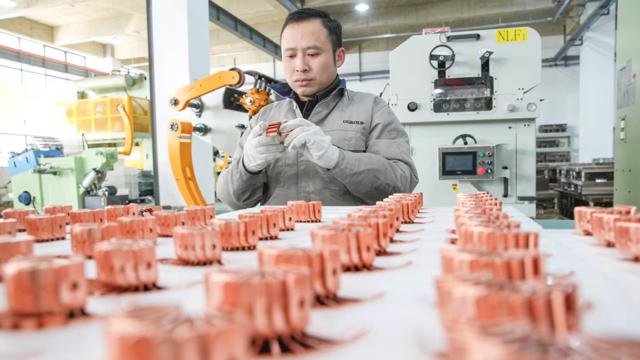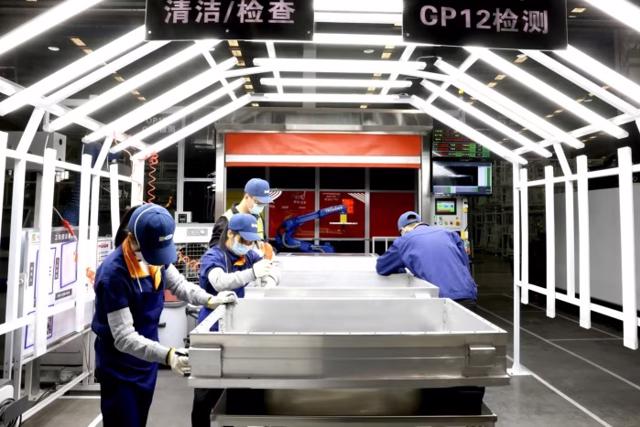Transport & Environment (T&E), an environmental advocacy group, has warned that current partnerships between Chinese battery manufacturers and European automakers are overly focused on securing short-term battery supply without any legal framework for technology sharing. This, according to T&E, could lead to future geopolitical and security risks.
Julia Poliscanova, Senior Director at T&E, stated: "We can spend another 10 or 15 years trying and failing with companies like Northvolt. Or we can benefit from existing expertise and use it to catch up quickly—just as the Chinese have done over the past 20 years."

The warning comes as Europe attempts to reshape its strategy to reduce dependence on China by developing local supply chains for green technologies. However, this ambition has been shaken by the recent setbacks of Northvolt, once seen as Europe’s greatest hope for battery production.
To fill the gap, many European automakers are partnering with Chinese battery manufacturers to secure supplies for their aggressive electric vehicle (EV) rollouts, driven by increasingly stringent emissions regulations.
In December, Stellantis announced plans to build a €4.1 billion lithium battery plant in Spain in collaboration with China’s CATL, the world’s largest battery producer. According to the Spanish government, the project received nearly €300 million in state aid—yet no conditions were imposed regarding technology or skill transfers. Stellantis has not commented on its contract with CATL.
Volkswagen has also partnered with China’s Gotion High-Tech for its battery plant in Salzgitter. The German automaker became Gotion’s largest shareholder when its Chinese subsidiary invested €1.1 billion in 2020. However, T&E’s study suggests there has been little intellectual property ownership or knowledge transfer.
Volkswagen, on the other hand, stated that there has been "significant knowledge transfer" between partners, covering both general and specific technical matters, as well as personnel exchanges.
"Without additional European requirements, we will learn nothing. We will only be an assembly plant," Poliscanova warned.
According to T&E, more than 90% of EV and storage batteries are produced by South Korean and Chinese companies, while 40% of confirmed gigafactories in Europe are supplied by the same Asian firms.
Meanwhile, U.S. automakers have opted to partner primarily with South Korean battery manufacturers. Ford, despite its partnership with China’s CATL, has also established a joint venture with SK. General Motors has teamed up with Samsung SDI. When collaborating with Chinese manufacturers like BYD, Washington has imposed strict skill transfer and partnership control requirements.
Brussels is now considering requiring Chinese firms to transfer intellectual property to European businesses in exchange for EU subsidies. However, these proposed conditions are far weaker than those enforced in China and the U.S.
The warning comes as European companies struggle to catch up with their Asian competitors while facing slowing EV demand and funding shortages.
Yann Vincent, CEO of French battery manufacturer Automotive Cells Company (ACC), told the Financial Times that the joint venture—backed by Stellantis, Mercedes-Benz, and TotalEnergies—has recently halted expansion plans beyond its Dunkirk facility to Germany and Italy due to a slowdown in the EV market.
As a result, a previously agreed €4 billion project funding package for expansion has been withdrawn. Instead, ACC has secured an €845 million bank loan, guaranteed by Mercedes and Stellantis, to continue developing its Dunkirk facilities.

Vincent acknowledged the difficulties, stating: "We see that the market is slowing down, so we must be cautious with large investments."
Benoit Lemaignan, CEO of French battery startup Verkor, echoed this sentiment, noting that the slowdown in EV demand has made securing funding increasingly challenging.
To cope with financial pressures, ACC is considering developing a low-cost battery based on lithium-iron-phosphate (LFP) technology—an affordable but less energy-dense alternative, similar to what CATL has pioneered. However, Vincent cautioned that "it’s uncertain whether this will be feasible."
Chinese pioneers are far ahead in this segment of the industry, while Northvolt and other European companies have so far focused on nickel-manganese-cobalt (NMC) batteries, which are more expensive but require less frequent charging.
Another major challenge for European firms is achieving large-scale battery production. According to Marc Alochet, a former French automotive engineer, knowledge transfer across the entire battery "value chain" is essential. He pointed out that China required such transfers from European automakers operating in the country at the beginning of the century.
"This delay is significant, but it could help European companies accelerate their progress," he added.

Ngan Thanh Technology Company Limited
Address: Hamlet 5, Group 55, Tam An Commune, Long Thanh District, Dong Nai Province, Vietnam
Email: nganthanh.cleantech@gmail.com
Hotline: 0978 390 739
TIN: 3603957845
Receive news about the latest products and solutions